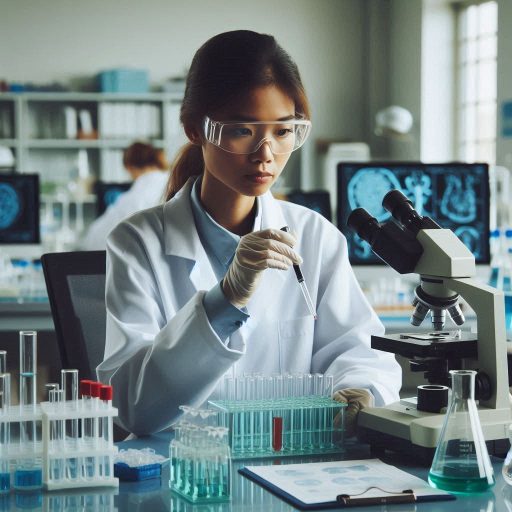Introduction
Immunology is a fascinating field focused on the immune system and its functions.
This discipline studies how the body defends against diseases.
Immunologists explore the complexities of immune responses and develop treatments for various conditions.
Their work significantly impacts healthcare and patient outcomes.
Choosing a career in immunology can be rewarding and challenging.
As the field evolves, immunologists must adapt to new discoveries and technologies.
This dynamic environment requires professionals to possess specific key skills.
Having strong skills is essential for success in immunology.
A solid foundation in biology and chemistry underpins many concepts in this field.
Critical thinking allows immunologists to analyze data effectively and solve complex problems.
Additionally, effective communication skills facilitate collaboration and knowledge sharing.
Moreover, attention to detail is vital for accurate research and experiments.
Adaptability enables immunologists to stay current with emerging trends.
Lastly, strong time management skills help manage multiple responsibilities efficiently.
By developing these key skills, aspiring immunologists can prepare for a successful and fulfilling career in this impactful field.
Strong background in biology and chemistry
A strong background in biology and chemistry is essential for a successful career in immunology.
Immunologists study the immune system’s functions and disorders, making a solid understanding of biological principles crucial.
They must grasp how cells, tissues, and organs interact to protect the body from diseases.
Understanding of Basic Biological Principles
Understanding basic biological principles helps immunologists identify how the immune system responds to pathogens.
They need to know about cell types, such as lymphocytes and macrophages, and their roles in immune responses.
Immunologists also study how the immune system differentiates between self and non-self.
This knowledge is vital for understanding autoimmune diseases and developing treatments.
Proficiency in Chemistry for Interpreting Complex Biological Processes
Proficiency in chemistry is equally important.
Immunologists must interpret complex biological processes that involve chemical reactions.
Knowledge of biochemistry aids in understanding how molecules interact within cells.
For instance, they must know how antigens and antibodies interact to trigger immune responses.
This knowledge allows immunologists to develop targeted therapies and vaccines effectively.
Ability to Apply Knowledge in a Practical Laboratory Setting
Additionally, immunologists must be skilled in laboratory techniques that involve both biology and chemistry.
They often work with various assays to measure immune responses.
Understanding the underlying biological and chemical principles helps them design effective experiments.
Knowledge of proper laboratory protocols ensures accurate and reliable results.
Immunologists use techniques like ELISA (enzyme-linked immunosorbent assay) to measure proteins or antibodies.
These assays require a solid grasp of both biology and chemistry to interpret results accurately.
Understanding these methods allows immunologists to assess the effectiveness of treatments and vaccine candidates.
Furthermore, a strong background in chemistry enables immunologists to comprehend drug interactions and side effects.
They must evaluate how medications influence immune responses and develop strategies for improving treatment outcomes.
This understanding is vital for translating research into clinical practice.
Moreover, immunologists often collaborate with professionals in various fields, including pharmacology and biotechnology.
A solid foundation in biology and chemistry allows them to communicate effectively with colleagues and contribute to multidisciplinary teams.
This collaboration fosters innovation and accelerates advancements in immunological research.
A strong background in biology and chemistry is vital for success in immunology.
Understanding biological principles helps immunologists assess immune responses and identify diseases.
Proficiency in chemistry enables them to interpret complex biological processes and design effective experiments.
Additionally, practical laboratory skills ensure accurate results and facilitate collaboration with other professionals.
Aspiring immunologists must prioritize building a solid foundation in these subjects to thrive in their careers.
This knowledge will empower them to advance the field and improve patient outcomes.
Critical thinking and problem-solving skills
Critical thinking and problem-solving skills are essential for a successful career in immunology.
Immunologists must analyze complex data to draw meaningful conclusions.
An analytical mindset helps them interpret experimental results accurately.
They often work with large data sets and need to identify patterns and trends.
Analytical Mindset for Interpreting Data and Results
Immunologists must be skilled in troubleshooting experiments.
Research often involves unexpected outcomes that require quick thinking.
They need to assess the situation, identify potential issues, and implement solutions.
This ability to troubleshoot ensures that research continues despite challenges.
Ability to Troubleshoot Experiments and Research Findings
A creative approach to problem-solving is equally important.
Immunologists frequently encounter obstacles in their research.
They must think outside the box to develop innovative solutions.
This creativity drives advancements in immunological research and helps overcome scientific challenges.
Analytical skills help immunologists evaluate the efficacy of treatments.
They must analyze clinical trial data to determine how well a therapy works.
Strong critical thinking enables them to differentiate between successful and unsuccessful approaches.
This evaluation informs future research directions and clinical applications.
Additionally, problem-solving skills enhance collaboration among research teams.
Immunologists often work with diverse groups, including biologists, chemists, and clinicians.
Effective communication and critical thinking foster a collaborative environment.
Teams can share ideas and strategies to tackle complex problems together.
Creative Problem-Solving Skills to Address Challenges in Research
Interpreting data also requires a solid understanding of statistics.
Immunologists need to apply statistical methods to validate their findings.
They must recognize the significance of their results and avoid drawing false conclusions.
Proficiency in statistics strengthens their analytical skills and supports evidence-based decision-making.
Furthermore, immunologists often face ethical dilemmas in their research.
Critical thinking allows them to evaluate the implications of their work.
They must consider the potential impact of their research on patients and society.
This thoughtful approach ensures responsible research practices.
In addition, creative problem-solving skills facilitate the development of new methodologies.
Immunologists often need to refine existing techniques or create new ones.
This innovation leads to more accurate and efficient research processes.
The ability to adapt to new challenges is vital in a rapidly evolving field.
Moreover, critical thinking supports lifelong learning.
Immunologists must stay updated on emerging research and techniques.
They need to evaluate new information critically and integrate it into their work.
This adaptability enhances their skills and ensures continued professional growth.
Critical thinking and problem-solving skills are vital for immunologists.
An analytical mindset enables them to interpret data and troubleshoot experiments effectively.
Creative problem-solving fosters innovation and collaboration in research.
By prioritizing these skills, immunologists can overcome challenges and advance the field of immunology.
This foundation helps them make meaningful contributions to science and improve patient outcomes.
Read: Essential Skills and Tools for Modern Chemists in America
Effective communication skills
Effective communication skills are essential for success in immunology.
Immunologists must present their research findings clearly to peers and colleagues.
Strong verbal communication allows them to share complex ideas effectively.
They often present at conferences and meetings, making clear communication critical.
Ability to Present Research Findings to Peers and Colleagues
Immunologists must also excel in writing.
Clear writing skills are necessary for publishing papers and grants.
They need to convey their research clearly and concisely.
Strong writing enables them to articulate their ideas and findings persuasively.
When writing research papers, immunologists follow specific guidelines.
They must ensure that their writing is accessible to diverse audiences.
This includes scientists from various fields and the general public.
Clarity in writing fosters understanding and encourages collaboration.
Clear Writing Skills for Publishing Papers and Grants
Grant writing is another important aspect of communication.
Immunologists often seek funding for their research projects.
They must write compelling proposals to attract potential sponsors.
A well-written grant proposal highlights the significance of their research.
Effective communication extends beyond writing and presentations.
Immunologists also need strong interpersonal skills.
They frequently collaborate with diverse teams, including researchers, clinicians, and industry partners.
Good interpersonal skills foster a positive work environment and facilitate teamwork.
Strong Interpersonal Skills for Working in a Collaborative Research Environment
Listening is a key component of effective communication.
Immunologists must listen actively to their colleagues and collaborators.
This attentiveness helps them understand different perspectives and ideas.
Active listening enhances collaboration and encourages knowledge sharing.
Networking plays a significant role in a successful career in immunology.
Immunologists need to build professional relationships within the scientific community.
Strong communication skills help them connect with mentors, peers, and industry leaders.
These connections can lead to collaborative projects and career opportunities.
Additionally, effective communication aids in educating others.
Immunologists often mentor students and junior researchers.
They must convey complex concepts in an understandable way.
This mentoring helps foster the next generation of scientists.
In clinical settings, effective communication is vital.
Immunologists interact with patients to explain diagnoses and treatments.
They must convey information clearly and empathetically.
This clarity ensures that patients understand their conditions and treatment options.
Furthermore, effective communication contributes to public understanding of science.
Immunologists often engage in outreach activities.
They may participate in community events or media interviews.
Clear communication helps demystify scientific concepts and promotes public interest in immunology.
Effective communication skills are critical for immunologists.
They must present research findings, write clearly, and foster collaboration.
Strong interpersonal skills enhance teamwork and mentorship.
By prioritizing effective communication, immunologists can make meaningful contributions to their field and society.
These skills help bridge the gap between research and real-world applications, ultimately improving health outcomes and advancing scientific knowledge.
Read: The Impact of Technology on the Chemist Profession in the US

Attention to detail and accuracy
Attention to detail and accuracy is crucial in immunology.
Precision in conducting experiments directly impacts the validity of research findings.
Immunologists must carefully follow protocols to ensure consistent results.
Any deviation can lead to erroneous conclusions, undermining the research.
Precision in Conducting Experiments and Recording Data
Recording data accurately is equally important.
Immunologists must document their observations meticulously.
This documentation allows for accurate analysis and reproducibility of experiments.
It also provides a reliable foundation for future research.
Thoroughness in Analyzing Results and Drawing Conclusions
Thoroughness in analyzing results is essential for drawing valid conclusions.
Immunologists must critically evaluate their data to identify patterns and trends.
They should also consider potential confounding variables that may affect their findings.
This analytical mindset enables them to make informed decisions based on their research.
Commitment to Accuracy in All Aspects of Research and Testing
Commitment to accuracy extends to all aspects of research and testing.
Immunologists must ensure that their methodologies are sound and validated.
Transform Your Career Today
Unlock a personalized career strategy that drives real results. Get tailored advice and a roadmap designed just for you.
Start NowThey should regularly calibrate their equipment to maintain accuracy in measurements.
This dedication to precision contributes to the overall reliability of their work.
Attention to detail also plays a significant role in peer review.
Before submitting research for publication, immunologists must review their work thoroughly.
They should check for errors in data, writing, and formatting.
A well-reviewed manuscript enhances credibility and increases the likelihood of acceptance.
In clinical settings, attention to detail is vital for patient safety.
Immunologists must accurately interpret test results and provide precise diagnoses.
Mistakes can have serious consequences, affecting patient care and treatment outcomes.
Therefore, they must remain vigilant in their work.
Furthermore, attention to detail aids in compliance with regulatory standards.
Immunologists must adhere to guidelines set by governing bodies.
This compliance ensures that their research meets ethical and scientific standards.
It also enhances the credibility of their findings.
In collaborative environments, attention to detail fosters effective communication.
When immunologists share data, they must present it clearly and accurately.
This clarity ensures that all team members understand the research’s implications.
Read: US Chemistry Conferences and Symposiums to Attend in 2024
You Might Also Like: Online Courses to Boost Biostatistics Knowledge
Showcase Your Business Today
Reach thousands of readers actively exploring professional services. Publish your business profile and grow your audience now.
Publish NowAdaptability and flexibility
Adaptability and flexibility are essential skills for a successful career in immunology.
The field constantly evolves, with new techniques and discoveries emerging regularly.
Immunologists must remain willing to learn and adopt these advancements.
This willingness ensures they stay competitive and effective in their research.
Willingness to Learn New Techniques and Methods in the Field
Learning new techniques is crucial for professional growth.
Immunologists often encounter novel methodologies that enhance their work.
Embracing these techniques can improve research outcomes and efficiency.
For instance, advancements in gene editing and immunotherapy require an open mindset.
Staying updated on the latest developments helps immunologists innovate and solve complex problems.
Ability to Adjust to Changing Research Priorities and Projects
Additionally, research priorities can change rapidly.
Projects may shift focus due to new findings or funding availability.
Immunologists must adapt quickly to these changes.
They should be prepared to pivot their research strategies as needed.
Flexibility in approach enables them to remain productive despite shifting landscapes.
Flexibility in Working with Diverse Teams and Collaborators
Collaborating with diverse teams is another vital aspect of adaptability.
Immunologists often work alongside professionals from various disciplines.
This collaboration fosters creativity and enhances research quality.
Effective communication and teamwork are essential for success in these environments.
Immunologists should embrace different perspectives and expertise to drive projects forward.
Working with collaborators requires an open mind and patience.
Team dynamics can vary, and adapting to these differences is vital.
Immunologists should learn to navigate interpersonal relationships and foster collaboration.
They must appreciate the strengths each team member brings to the table.
This flexibility promotes a positive work environment and enhances research quality.
Immunologists may also need to adjust to various work settings.
They might work in laboratories, hospitals, or academic institutions.
Each environment has unique demands and expectations.
Adapting to these different contexts is essential for success.
Immunologists should remain open to new experiences and challenges.
Staying adaptable also means being receptive to feedback.
Constructive criticism can lead to significant improvements in research.
Immunologists should actively seek input from peers and mentors.
They must reflect on this feedback and make necessary adjustments.
This mindset fosters continuous growth and enhances research effectiveness.
Furthermore, technology plays a crucial role in adaptability.
Immunologists must be comfortable using advanced tools and software.
Familiarity with bioinformatics and data analysis software is increasingly important.
Adapting to new technologies can significantly impact research efficiency and accuracy.
Adaptability and flexibility are vital skills for immunologists.
A willingness to learn new techniques, adjust to changing priorities, and collaborate effectively drives success.
By cultivating these skills, immunologists can thrive in an ever-evolving field.
Ultimately, their ability to adapt will enhance their contributions to scientific advancements and patient care.
Read: Key Roles and Responsibilities of a Chemist in the US
Time management and organization
Time management and organization are critical skills for immunologists.
These professionals often work in fast-paced environments, juggling multiple projects.
Effectively prioritizing tasks allows them to meet deadlines consistently.
By mastering these skills, immunologists can enhance their productivity and research outcomes.
Ability to Prioritize Tasks and Meet Deadlines in a Fast-Paced Environment
Immunologists face various tasks daily.
They must determine which activities require immediate attention.
Prioritizing tasks helps them focus on critical research elements.
It also enables them to allocate their time efficiently.
Using to-do lists or project management tools can streamline this process.
These tools help track deadlines and ensure tasks are completed on schedule.
Additionally, meeting deadlines is essential in the research field.
Delays can hinder progress and affect grant funding.
Immunologists must develop strategies to manage their time effectively.
Setting clear milestones for projects can help maintain focus.
Regularly reviewing progress ensures that they stay on track.
Efficient Organization of Lab Materials and Resources
Organization plays a vital role in lab efficiency.
Immunologists must maintain an orderly workspace to avoid confusion.
An organized laboratory enables quick access to materials and equipment.
This accessibility saves valuable time during experiments.
They should label all samples and reagents clearly to prevent mix-ups.
A well-organized lab also reduces the risk of errors in research.
Immunologists should develop systems for organizing their resources.
Creating designated storage areas for equipment and supplies promotes efficiency.
They can use inventory management software to track materials.
This software helps manage stock levels and order supplies when necessary.
Proper organization minimizes downtime and enhances research productivity.
Effective Time Management for Balancing Multiple Projects and Responsibilities
Balancing multiple projects requires excellent time management.
Immunologists often juggle research, meetings, and administrative tasks.
They must allocate time wisely to avoid becoming overwhelmed.
Establishing a daily schedule helps them allocate time effectively.
Blocking out specific time slots for focused work improves concentration.
Time management also involves recognizing when to delegate tasks.
Immunologists can benefit from collaborating with colleagues and support staff.
Delegating responsibilities allows them to focus on high-priority projects.
Teamwork enhances overall productivity and ensures that tasks are completed efficiently.
Setting boundaries is another essential aspect of effective time management.
Immunologists should protect their time from unnecessary interruptions.
This may involve establishing ‘do not disturb‘ periods for focused work.
By minimizing distractions, they can enhance their concentration and productivity.
Lastly, self-care is crucial for effective time management.
Immunologists should prioritize their well-being to maintain productivity.
Regular breaks and physical activity help recharge their energy levels.
Balancing work and personal life promotes long-term success and job satisfaction.
Time management and organization are vital skills for immunologists.
Prioritizing tasks, maintaining an organized lab, and effectively managing time enhances productivity.
By developing these skills, immunologists can thrive in their research careers.
Ultimately, strong time management leads to better outcomes in scientific research and patient care.
Conclusion
A successful career in immunology requires key skills.
These include a strong background in biology and chemistry.
Critical thinking and problem-solving skills enhance research capabilities.
Effective communication skills enable researchers to present findings clearly.
Attention to detail ensures accuracy in experiments and data analysis.
Adaptability allows immunologists to learn new techniques and adjust to changing projects.
Time management helps them prioritize tasks and meet deadlines.
Continuous learning and development are essential in immunology.
The field constantly evolves with new discoveries and advancements.
Aspiring immunologists should seek opportunities to expand their knowledge.
Engaging in workshops, conferences, and additional coursework can be beneficial.
Mentorship can also provide valuable guidance and support.
Strengthening these skills is crucial for future success.
By focusing on skill development, aspiring immunologists can enhance their career prospects.
A solid foundation in these key areas will prepare them for the challenges ahead.
With dedication and hard work, they can make meaningful contributions to the field.
Ultimately, these efforts will help them excel in their careers and improve patient outcomes.
[E-Books for Sale]
The Big Book of 500 High-Paying Jobs in America: Unlock Your Earning Potential
$19.99 • 500 High-Paying Jobs • 330 pages
Explore 500 high-paying jobs in America and learn how to boost your career, earn more, and achieve success!
See All 500 High-Paying Jobs of this E-Book
1001 Professions Without a Degree: High-Paying American Jobs You Can Start Now
$19.99 • 1001 Professions Without a Degree • 174 pages
Discover 1001 high-paying jobs without a degree! Unlock career tips, skills, and success strategies for just $19.99!




